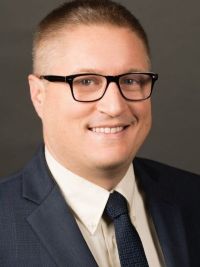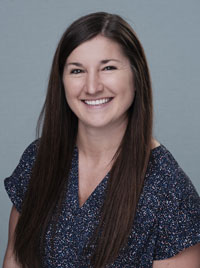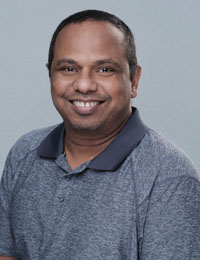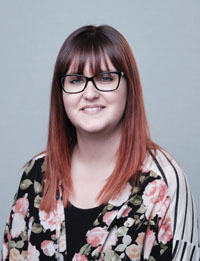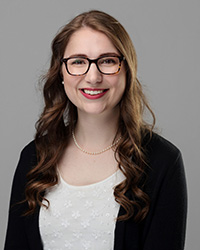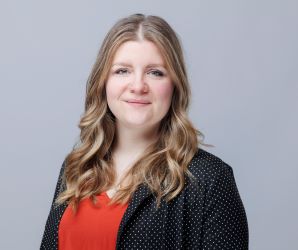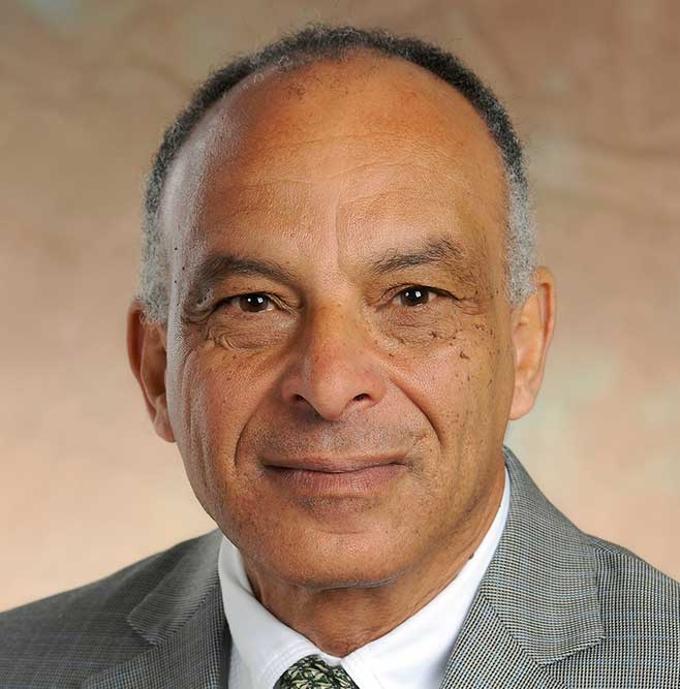Our Culture
The Fedoruk Centre is made up of a team of dedicated experts who are passionate about building a career in a purpose-driven organization. Our workplace offers both support and autonomy, respecting the importance of work-life balance.
Our staff members have opportunities to learn new skills, explore ideas and work alongside leading-edge scientists knowing that their work benefits society in many ways.
Our Organization
Our organizational chart reflects the line-management accountabilities and roles of staff members and also shows the committees advising the Board or Management about the key activities of the organization. Additionally, it shows the reporting relationships within our not-for-profit corporation from Management through the independent Board of Directors to our sole Member, the University of Saskatchewan, represented by the USask Board of Governors.
Staff
Jeter Hall completed his PhD at the University of Utah, studying gamma rays produced by dark matter annihilation. He went on to complete a postdoctoral fellowship at Fermilab, where he contributed to underground dark matter experiments including CDMS-II, SuperCDMS, and COUPP. Jeter's work ranged from improving electronics performance in cryogenic detectors to analyzing acoustic signatures in bubble chambers and deploying new technologies at SNOLAB.
Since 2017, Jeter held the position of Director of Research at SNOLAB, one of Canada’s premier facilities for astro-particle research. In this role, Jeter was accountable for the successful execution of the laboratory's large suite of projects in tandem with the successful operation of its scientific program. Jeter worked across organizational boundaries to facilitate the successful completion of the lab's portfolio of projects and programs alongside the lab's organizational commitments.
Jeter joined the Fedoruk Centre as executive director in July 2025 to accompllish impacts in the following areas: (1) Nuclear imaging tools and methods to advance life sciences, agri-biotechnologies and medicine; (2) Material sciences, through nuclear techniques, such as neutron scattering, to improve energy, health, and transportation; and (3) Understanding the practical and social aspects of nuclear energy, to inform decision-making towards a clean, sustainable future.
Niki Schrie
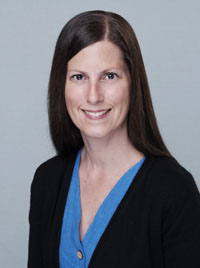
Human Resources & Operations Manager
Secretary to the Board of Directors
niki.schrie@fedorukcentre.ca
306-966-3377
Board of Directors
Esam Hussein, PhD, PEng, FCSSE, is a professor emeritus of Engineering and Applied Science and an adjunct professor in Physics at the University of Regina (UofR). He is also a professor emeritus of Mechanical Engineering at the University of New Brunswick (UNB). He retired as Dean of Engineering and Applied Science at UofR. After completing his undergraduate studies and a master's degree in nuclear engineering at Alexandria University, Egypt, he earned a PhD also in nuclear engineering from McMaster University. He was employed as a Nuclear Design Engineer at Ontario Hydro (now Ontario Power Generation). Subsequently, he joined the University of New Brunswick – Fredericton, where he taught in Chemical then Mechanical Engineering, and served as Department Chair, Associate Dean and President of the Association of UNB Teachers.
Dr. Hussein led a research program that focused on the industrial and medical uses of nuclear and atomic radiation for nondestructive testing and imaging to detect threat materials. His current research focus is on small modular reactors. He has supervised many graduate students, published numerous scientific papers and industrial reports, is a holder of six patents, and the author of three books on radiation science and applications. His research has led to the establishment of a start-up company (Inversa Systems, Ltd). Dr. Hussein received the Association of Professional Engineers and Geoscientists of Saskatchewan’s Outstanding Achievement Award in 2019, the Canadian Nuclear Innovation Achievement Award in June 2003, and the Sylvia Fedoruk Prize in 2000. He is currently a receiving editor of Applied Radiation and Isotopes and of Physics Open.
Hussein is a registered professional engineer in the Provinces of Saskatchewan, New Brunswick and Ontario, and a fellow of the Canadian Society for Senior Engineers. He has been a member of the Canadian Nuclear Society, American Nuclear Society, American Society of Mechanical Engineer, IEEE Nuclear IEEE Nuclear and Plasma Sciences Society and American Society for Nondestructive Testing. He is an executive councillor of the International Radiation Physics Society, and was a member of the working Group for the CANDU Reactor Textbook for the University Network of Excellence in Nuclear Engineering. Hussein served as a member of the Board of Governors of the University of New Brunswick and the Board of the Petroleum Technology Research Centre.
Katherine Zukotynski

Vice-Chair of the Board
Dr. Katherine Zukotynski is an Associate Professor in the Departments of Medicine and Radiology at McMaster University and an Associate Member of the School of Biomedical Engineering at McMaster University. She is affiliated with several hospitals including Children’s Hospital Boston.
After completing an undergraduate degree in Engineering Science at the University of Toronto, Dr. Zukotynski completed medical training followed by a residency in radiology, also at the University of Toronto. In 2009, she completed nuclear medicine training through the Joint Program in Nuclear Medicine at Harvard. She was a staff radiologist at the Dana-Farber Cancer Institute and Brigham and Women’s Hospital from 2009 through 2012, and Instructor at Harvard Medical School. Subsequently, Dr. Zukotynski was a staff radiologist at Sunnybrook Health Sciences Centre from 2012 through 2015, an Assistant Professor at the University of Toronto and a Visiting Assistant Professor at Harvard Medical School. She is board certified in nuclear cardiology, as well as in nuclear medicine and radiology, in both the United States and Canada.
Dr. Zukotynski is involved in medical imaging research. Her main areas of research are in PET/CT, particularly as it relates to oncology, neurodegenerative disease and machine learning. She received the RSNA Research and Education Foundation Roentgen Resident/ Fellow Research Award first as a radiology resident and then as a nuclear medicine resident. She held an RSNA Research Scholar Grant from 2012-2014, and currently holds approximately $5M in funding for molecular imaging, predominantly in prostate cancer research.
Dr. Zukotynski is also actively involved in the leadership of several imaging societies. She is Chair of the American Roentgen Ray Society (ARRS) Nuclear Medicine Section Instructional Courses, Chair of the Radiologic Society of North America (RSNA) Nuclear Medicine Refresher Course Committee Track, as well as the Research and Education Public Relations Committee. She is also Secretary of the American College of Nuclear Medicine (ACNM) and immediate past Treasurer/Secretary of the Society of Nuclear Medicine and Molecular Imaging (SNMMI), as well as immediate past president of the SNMMI PET Center of Excellence and Eastern Great Lakes Chapter.
Shawn Exner
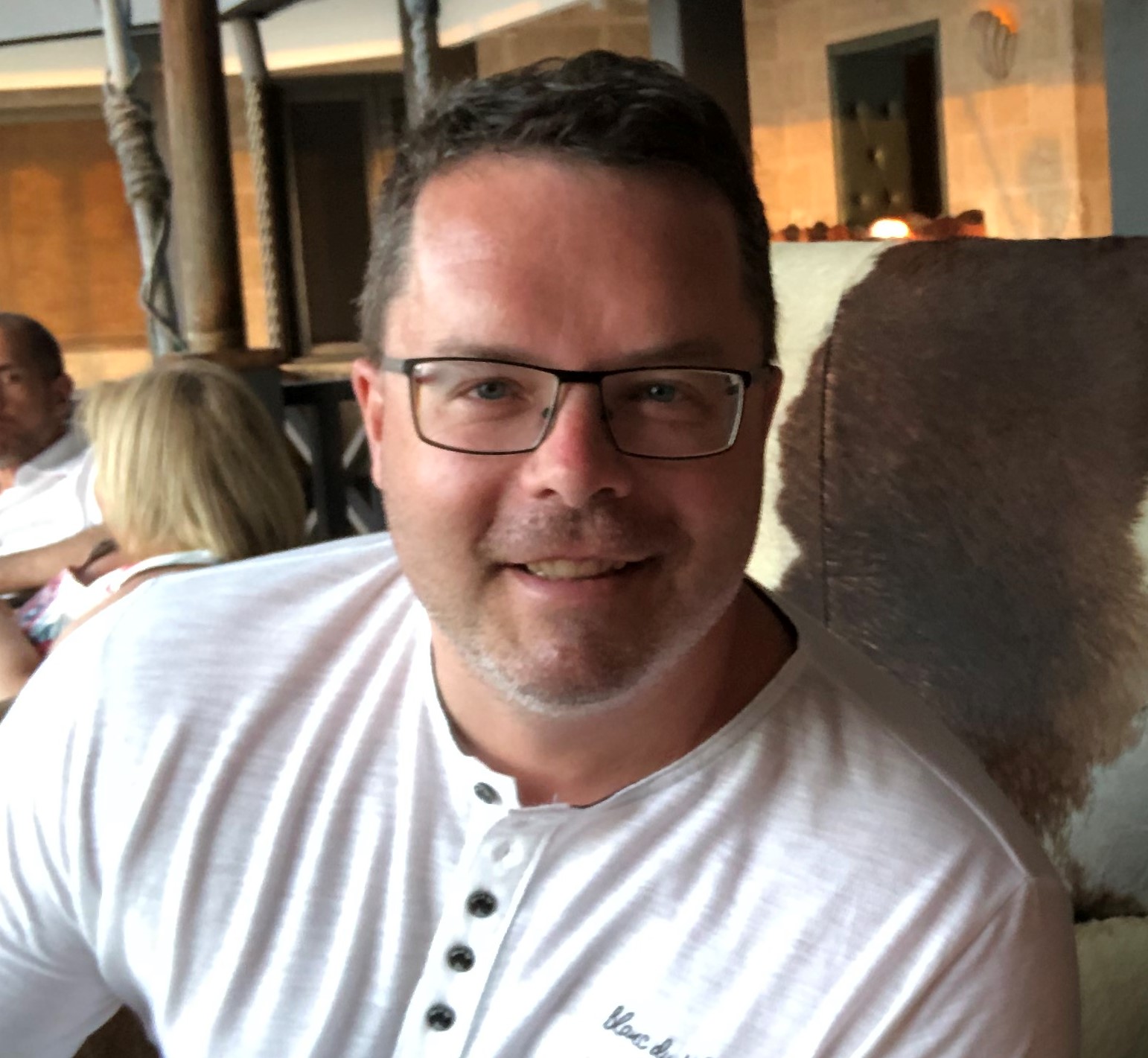
Shawn Exner is the Senior Director/Head of Corporate Development for Cameco Corporation, one of the world’s largest diversified nuclear fuel companies. Based in Saskatoon, his main responsibilities are to lead the evaluation and recommendation of investment and divestment opportunities for Cameco throughout the front-end of the nuclear fuel cycle (exploration, development, conversion, enrichment, and fuel fabrication). In addition, his responsibilities include the creation of new joint ventures or shareholder agreements and a variety of other commercial arrangements, as well as negotiating the restructuring of these agreements when circumstances warrant. Shawn has played a key role in Cameco’s acquisitions over the last 17 years and has been involved in the post-investment management and governance related to Cameco’s investments in the Bruce Power Limited Partnership, JV Inkai, Global Laser Enrichment and Westinghouse Electric Company.
Shawn holds a Bachelor of Commerce degree from the University of Saskatchewan and is a Chartered Professional Accountant and a member of the Chartered Professional Accountants (Canada). Shawn has been with Cameco for 28 years with the first 10 years in various financial reporting and long-term planning roles, and the last 18 years with Corporate Development.
Brigitte Guérin

Iain Harry

Deidre (Dee) Henne
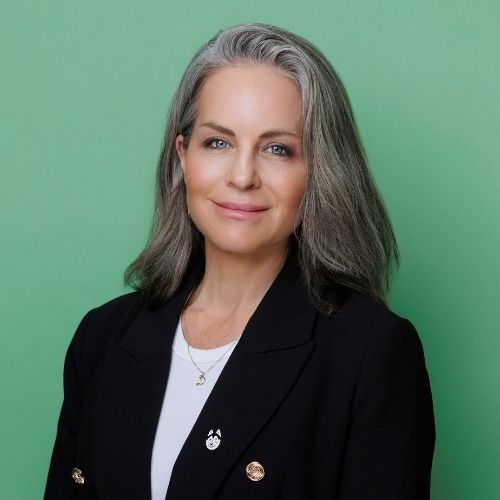
Deidre ("Dee") Henne is the University of Saskatchewan's Chief Financial Officer (CFO), reporting to the President and working with the university community to develop financial strategies to ensure financial sustainability and resiliency, and to invest in advancing the university's mission and strategic priorities.
Originally from Hamilton, Dee has over 25 years of experience supporting both higher education and health sciences in research-intensive settings. Dee has taken residence in Saskatoon close to the university to support a 5-year term July 1, 2024 to June 30, 2029. Prior to joining the university, Dee established her own advisory services company, LEAD, serving non-profit organizations in areas of strengthening financial health, strategic resource allocations, and sustainability-related financial reporting. Dee also served as Chief Financial Officer at McMaster University and served Hamilton Health Sciences (Canada’s second largest research hospital).
Dee’s past community and volunteer work includes serving City of Hamilton’s Ward 1 Budget Committee, Human Resources Professionals Association (HRPA) Board, Community Care Access Centre’s Board, and more. Dee’s most recent voluntary role is a 3-year (July 2024 to June 2027) appointment on Canada’s new Reporting and Assurance Standards Oversight Council (RASOC), which oversees the work of the Accounting Standards Board (AcSB), Public Sector Accounting Board (PSAB), the Canadian Sustainability Standards Board (CSSB), and the Auditing and Assurance Standards Board (AASB).
Dee has been recognized for her contributions to the Ontario and Canadian higher education sector, receiving the Canadian Association of University Business Officers (CAUBO) Leadership in Learning award in 2017, the Council of Ontario Financial Officers Distinguished Leadership Award in 2019, and CAUBO’s most distinguished recognition the 2023 Ken Clements Award, which recognizes an administrator who has demonstrated outstanding leadership and has made an extraordinary contribution to the advancement of higher education administration.
Kim Kearfott
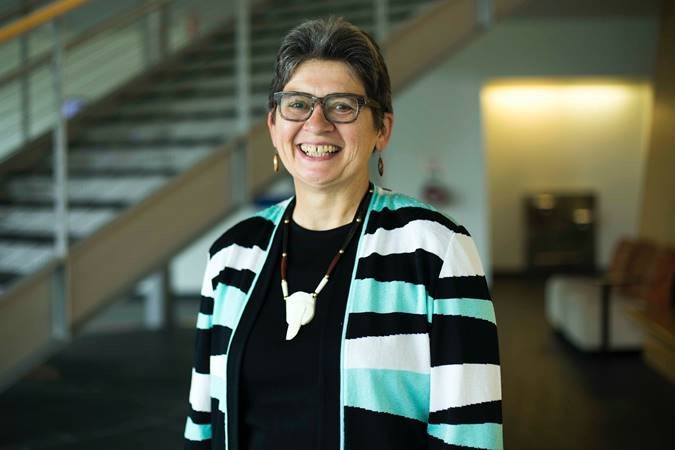
Kim Kearfott is a board-certified radiation safety specialist at both the practitioner (NRRPT) and professional (CHP) levels. She is a tenured full Professor of Nuclear Engineering and Radiological Sciences at University of Michigan with a Doctor of Science degree from M.I.T. with a doctoral minor from Harvard School of Public Health (nuclear medicine imaging, medical physics, radiation biology). She also earned a Master of Engineering degree in Nuclear Engineering from the University of Virginia in nuclear reactor safety. Professor Kearfott received National Science Foundation Presidential Young Investigator, Society of Nuclear Medicine Tetalman, Health Physics Society Elda Anderson, and American Nuclear Society Women's Achievement and Rockwell Lifetime Achievement awards. She is a Fellow of the Health Physics Society, the primary scientific organization of radiation protection specialists in the United States. She has served on the national board of directors of both the American Nuclear Society and the Health Physics Society. She completed training in the first class of FEMA Radiological Operations Support Specialists (ROSS).
Kim Kearfott has more than four decades of research and applied experience in radiation detection and radiological safety. She began her career in reactor safety analysis. She then became known for her early work on internal dose assessments for Positron Emission Tomography (PET) and for her designs of clinical PET facilities. She performed pioneering work in radon: discovering and mitigating the highest ever recorded domestic indoor radon air concentration. She has conducted projects in the personnel radiation monitoring, external dosimetry, and internal dose assessment. Her current research is the design of radiation detection systems for environmental radiation, homeland security, and nuclear weapons verification. Dr. Kearfott maintains an interest in measurement systems of all types, including the detection of conventional explosives. She holds several patents on radiation detection methods and detectors. Dr. Kearfott has supervised ~ 447 graduate and undergraduate student projects, resulting in more than 565 publications. An experienced teacher, Prof. Kearfott has presented more than 250 talks, 83 formal undergraduate and graduate courses, and 37 short courses.
Tom Kishchuk

Tom started his career in the field of heavy industrial equipment manufacturing for power generation at a then brand new company, Hitachi Canadian Industries Ltd. Over the next 26 years, Tom worked in many roles to support the needs of a growing business and in 2006, Tom was appointed as the first Canadian President and CEO of the Canadian operations.
Tom was appointed Vice-President Operational Support for Federated Co-operatives Limited (FCL) in 2015 where he led the Health and Safety, Logistics, Facilities Design and Development, and Growth and Business Development teams. Tom started his consulting business, TPK Management Consulting Inc. in 2020 to continue supporting organizations in their growth and improvement journeys.
Through his work, Tom has had the opportunity to conduct business in many countries and cultures, primarily those in Asia, Europe and North America. He has extensive Board experience in the corporate, co-operative and not-for-profit sectors and is currently Chair of the University of Saskatchewan, College of Engineering Dean’s Advisory Board. Recent past board director appointments have included the Saskatchewan Health Quality Council, Safe Saskatchewan, Saskatoon Community Foundation and the national board of Canadian Manufacturers and Exporters.
Tom has a BSc and MSc in Mechanical Engineering from the University of Saskatchewan, and completed the Ivey Executive Program at the Richard Ivey School of Business.
Dawn Pratt

Dawn Pratt is a member of the Muscowpetung Anihšināpēk Nation. With varied experience in science education and an indomitable spirit, she has forged a professional consultancy company, askenootow STEM Enterprise, as an Indigenous STEM Educational expert for the past 20 years (STEM = science, technology, engineering, and math). Dawn earned a Master of Science degree with a specialization in the design of organic adsorbent materials directed toward the removal of arsenic from contaminated water (University of Saskatchewan, 2011).
Dawn is fundamentally driven to reinstate Indigenous Elder and Knowledge Keeper teachings into STEM education for the benefit of Indigenous Peoples’ futures. She seeks to amplify Indigenous STEM role models and Indigenized STEM content by transforming instructional practices and curricula in ways that embrace Indigenous cultural, linguistic, and land-based traditions and resources.
Dawn remembers the moment her career calling took shape; in grade 4, her parents bought her a chemistry kit. Since then, she has pursued her passion for understanding the chemical world and sharing the joys of scientific discovery with children, youth, and adults. As part of realizing her passions, she is deeply dedicated to raising her two daughters to approach the world with a curiosity for STEM, replete with confidence in the Indigenous heritage she too derived from her family.
Baljit Singh
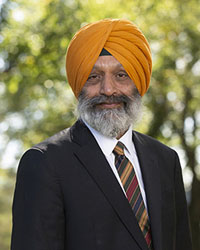
Dr. Baljit Singh is a highly accomplished researcher, educator and administrator in the field of veterinary medicine, with specific expertise in lung biology and anatomy. He began his role as Vice-President Research at the University of Saskatchewan in 2021, after serving as Dean of the University of Calgary Faculty of Veterinary Medicine (2016 – 2021), and serving as Associate Dean of Research at the Western College of Veterinary Medicine at the University of Saskatchewan (2011 – 2016).
Dr. Singh’s formal education includes a Bachelor of Veterinary Science and Animal Husbandry (BVSc and AH) and Master of Veterinary Science (MVSc) from Punjab Agricultural University in Punjab; a PhD from the University of Guelph; post-doctoral training at Texas A&M University and Columbia University, New York; and he completed licensing requirements set by the Canadian Veterinary Medical Association (CVMA) and American Veterinary Medical Association (AVMA) for foreign veterinary graduates.
Dr. Singh has received the 3M National Teaching Fellowship, the University of Saskatchewan’s Provost’s Prize for Innovative Practice of Teaching and Learning, University of Saskatchewan Master Teacher Award, and the Carl J. Norden Distinguished Teacher Award. He has also received the Outstanding Veterinary Anatomist Award from the American Association of Veterinary Anatomists, as well as the Pfizer Award for Research Excellence. In 2013 he was named a fellow of the American Association of Anatomists.
Dr. Singh’s research has focused on cell and molecular biology of lung inflammation. He is the author or co-author of more than ninety peer-reviewed journal articles and books, and has supervised the research training of more than eighty undergraduate, graduate and postdoctoral students.
Avery Vold

Avery Vold was appointed Vice President, Economic Development and Research Investments in January 2023. She joined Innovation Saskatchewan in 2018 and held various roles in Corporate Services, Strategy, and Governance. Prior to joining Innovation Saskatchewan, Avery spent four years with the University of Saskatchewan working in the Edwards School of Business, Executive Education department developing and administering professional development programs for the business community.
Avery holds a Bachelor of Commerce, majoring in Finance, from Edwards School of Business and a Master of Public Administration from Johnson Shoyama Graduate School of Public Policy. She is currently a board member of Saskatchewan’s first tech incubator, Co.Labs, the Global Agri-food Advancement Partnership, Interval House and Saskatchewan Jazz Festival.
Project Advisory Committee
Andrea Armstrong
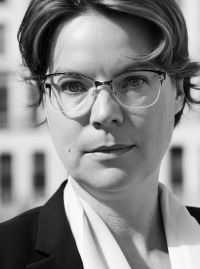
Dr. Andrea Armstrong has 18 years experience in the development and commercialization of medical isotope technologies. Prior to joining Synergy Oncology, she spent 14 years leading McMaster University’s radioisotope research program, where she led the commercialization of two large-scale production technologies, as well as the development of a new process for generating high-quality lutetium-177 in medium flux research reactors. She was a critical member of the multi-institutional team that secured $35 M from ISED Canada to create the Canadian Medical Isotope Ecosystem in 2023, and was the McMaster lead for the “Care By Air” initiative that saw the first-in-world use of a Remotely Piloted Aircraft System to deliver medical isotopes to hospital.
Andrea has a strong track record of building strategic partnerships to advance both medical and non-medical applications of nuclear technology. During her time at McMaster she established collaborations with scientists at national laboratories, universities, and the private sector, supporting research through provision of expertise, radiotracers, and isotopes. Andrea is the author of the university’s contribution to Canada’s Small Modular Reactor Action Plan, white papers on topics including Canada’s neutron gap and the global medical isotope supply chain, and 35+ peer-reviewed publications. As a recognized expert in her field, Andrea is a regular contributor, speaker, and panelist at events organized by groups including CNIC, CNA, CNS, NAYGN, NRCan, NWMO, OCNI, and TRIUMF. She is also an experienced educator, creating and delivering content for undergraduate and post-graduate courses and workshops, as well as public-facing events such as Doors Open and Nuclear Science Week.
Andrea is the chair of the Canadian Nuclear Society’s Science & Technology of Radioisotopes (STORI) division, a member of the IAEA’s Consultancy Group on Lu-177, and an Adjunct Professor in the Department of Chemistry & Chemical Biology at McMaster University. She holds a PhD in Chemistry from the University of Calgary.
Duane Bratt
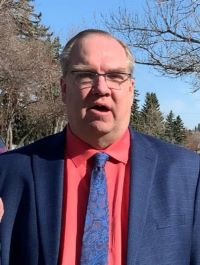
Chair in the Department of Economics, Justice, and Policy Studies at Mount Royal University (Calgary, AB)
Katherine Zukotynski

Dr. Katherine Zukotynski is an Associate Professor in the Departments of Medicine and Radiology at McMaster University and an Associate Member of the School of Biomedical Engineering at McMaster University. She is affiliated with several hospitals including Children’s Hospital Boston.
After completing an undergraduate degree in Engineering Science at the University of Toronto, Dr. Zukotynski completed medical training followed by a residency in radiology, also at the University of Toronto. In 2009, she completed nuclear medicine training through the Joint Program in Nuclear Medicine at Harvard. She was a staff radiologist at the Dana-Farber Cancer Institute and Brigham and Women’s Hospital from 2009 through 2012, and Instructor at Harvard Medical School. Subsequently, Dr. Zukotynski was a staff radiologist at Sunnybrook Health Sciences Centre from 2012 through 2015, an Assistant Professor at the University of Toronto and a Visiting Assistant Professor at Harvard Medical School. She is board certified in nuclear cardiology, as well as in nuclear medicine and radiology, in both the United States and Canada.
Dr. Zukotynski is involved in medical imaging research. Her main areas of research are in PET/CT, particularly as it relates to oncology, neurodegenerative disease and machine learning. She received the RSNA Research and Education Foundation Roentgen Resident/ Fellow Research Award first as a radiology resident and then as a nuclear medicine resident. She held an RSNA Research Scholar Grant from 2012-2014, and currently holds approximately $5M in funding for molecular imaging, predominantly in prostate cancer research.
Dr. Zukotynski is also actively involved in the leadership of several imaging societies. She is Chair of the American Roentgen Ray Society (ARRS) Nuclear Medicine Section Instructional Courses, Chair of the Radiologic Society of North America (RSNA) Nuclear Medicine Refresher Course Committee Track, as well as the Research and Education Public Relations Committee. She is also Secretary of the American College of Nuclear Medicine (ACNM) and immediate past Treasurer/Secretary of the Society of Nuclear Medicine and Molecular Imaging (SNMMI), as well as immediate past president of the SNMMI PET Center of Excellence and Eastern Great Lakes Chapter.
David W. Shoesmith
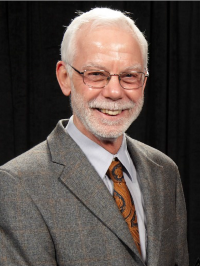
Facility Advisory Committee
Andrea Armstrong

Dr. Andrea Armstrong has 18 years experience in the development and commercialization of medical isotope technologies. Prior to joining Synergy Oncology, she spent 14 years leading McMaster University’s radioisotope research program, where she led the commercialization of two large-scale production technologies, as well as the development of a new process for generating high-quality lutetium-177 in medium flux research reactors. She was a critical member of the multi-institutional team that secured $35 M from ISED Canada to create the Canadian Medical Isotope Ecosystem in 2023, and was the McMaster lead for the “Care By Air” initiative that saw the first-in-world use of a Remotely Piloted Aircraft System to deliver medical isotopes to hospital.
Andrea has a strong track record of building strategic partnerships to advance both medical and non-medical applications of nuclear technology. During her time at McMaster she established collaborations with scientists at national laboratories, universities, and the private sector, supporting research through provision of expertise, radiotracers, and isotopes. Andrea is the author of the university’s contribution to Canada’s Small Modular Reactor Action Plan, white papers on topics including Canada’s neutron gap and the global medical isotope supply chain, and 35+ peer-reviewed publications. As a recognized expert in her field, Andrea is a regular contributor, speaker, and panelist at events organized by groups including CNIC, CNA, CNS, NAYGN, NRCan, NWMO, OCNI, and TRIUMF. She is also an experienced educator, creating and delivering content for undergraduate and post-graduate courses and workshops, as well as public-facing events such as Doors Open and Nuclear Science Week.
Andrea is the chair of the Canadian Nuclear Society’s Science & Technology of Radioisotopes (STORI) division, a member of the IAEA’s Consultancy Group on Lu-177, and an Adjunct Professor in the Department of Chemistry & Chemical Biology at McMaster University. She holds a PhD in Chemistry from the University of Calgary.
Justin Hicks
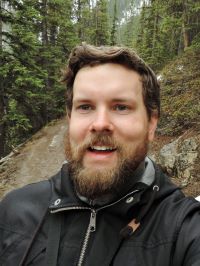
Frank Wuest

Frank Wuest is a Professor and, since December 2021, the Chair of the Department of Oncology at the University of Alberta. He obtained his Ph.D. in Chemistry from the Dresden University of Technology in Germany in 1999. Frank worked two years as a postdoctoral fellow at the School of Medicine in St. Louis before becoming the Head of the PET-tracer Division of the Research Centre Dresden-Rossendorf in 2001. In 2006, he accomplished his habilitation thesis in biochemistry at Dresden University of Technology, when he also received the Venia legendi in biochemistry.
In 2008, Frank started a new position as the Dianne and Irving Kipnes Chair in Radiopharmaceutical Sciences in the Department of Oncology at the University of Alberta. He was an Alberta Heritage Foundation for Medical Research Senior Scholar from 2010-2017. Frank also holds adjunct appointments with the Department of Chemistry and the Faculty of Pharmacy at the University of Alberta.
Frank’s research interests are embedded in the multidisciplinary field of translational cancer research with a particular focus on imaging biomarkers. His research aims to design, evaluate, and facilitate the clinical translation of innovative radiopharmaceuticals to optimize cancer diagnosis and treatment. His work has continuously been funded through various operating and infrastructure grants from CIHR, NSERC, CFI, AIHS, PCC, and ACF. He has published his work in over 190 peer-reviewed articles and several book chapters. Frank is also a co-lead of the Alberta Radiopharmaceutical Collaboration (ARC) to facilitate the rapid and safe clinical introduction of radiopharmaceuticals to enhance patient care.

